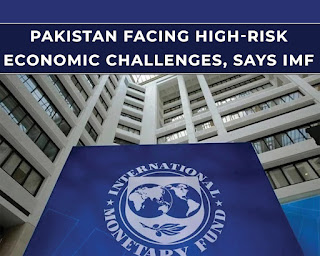Pakistan's Economic Challenges and the Need for Continued IMF Support
Pakistan's economy has been grappling with significant challenges, requiring external assistance to stabilize its macroeconomic situation and ensure long-term sustainability.
In its latest report, the International Monetary Fund (IMF) highlighted the complex and multifaceted nature of Pakistan's economic issues. It forced the government to continue adjustment and creditor support beyond the current program period. Here, we are aiming to provide a simplified overview of the key points from the report and the measures taken by the government to deal with the economic challenges.
Structural Challenges and IMF Support:
The IMF's report emphasizes that resolving Pakistan's structural challenges, particularly long-term balance of payments pressures will require sustained financial support and policy adjustments from external partners. The current standby arrangement and the upcoming election cycle may not be sufficient to achieve medium-term viability and repayment capacity.
Commitments by the Government:
The Pakistani government has agreed to a number of undertakings to address economic concerns in response to the IMF's recommendations. To tackle circular debt flow in the power sector, the government has pledged to increase electricity rates by Rs5 per unit and raise gas rates by over 40%. This move comes as the gas sector's circular debt competes with losses in the power sector.
Moreover, the government has promised to notify recent tariff increases determined by the National Electric Power Regulatory Authority (NEPRA) from July 1. It also plans to address quarterly and monthly tariff adjustments promptly, without any delays.
In the gas sector, the government has committed to immediate notification of gas tariff adjustments set by the Oil and Gas Regulatory Authority (OGRA). Additionally, it will merge gas rates for both local and imported natural gas through a weighted average tariff.
Fiscal Responsibility and Taxation:
To ensure fiscal responsibility, the government has vowed not to allow supplementary grants for any unbudgeted spending beyond the approved level by the parliament in the current fiscal year, until the formation of a new government after the elections, except in case of severe natural disasters.
The government has also undertaken not to launch any new tax amnesties or grant further tax exemptions in the next fiscal year without prior approval from the assembly. This commitment aims to improve tax collection and revenue generation.
Provincial Commitments:
The IMF report also highlights agreements with each province regarding their commitment to achieving a fiscal position consistent with the fiscal year's general government primary balance goal. The provinces have agreed to focus on urgent energy sector policies and avoid introducing fuel subsidies or cross-subsidy schemes in the current fiscal year and beyond.
Monetary and Financial Stability:
The government aims to ensure monetary and financial stability by returning to a market-determined exchange rate and lowering inflation toward the target rate. It also plans to rebuild foreign exchange reserves to strengthen its economic position.
To achieve market stability, the authorities will refrain from providing guidance or expressing preferences regarding the exchange rate to market participants through formal or informal administrative action.
Conclusion:
Pakistan faces significant economic challenges that demand careful and decisive actions. The IMF report emphasizes that in order to stabilize the nation's economic condition and ensure long-term sustainability, foreign partners must continue to provide financial support and make policy modifications. To achieve macroeconomic stability and pave the road for a stronger and more robust economy, the government's commitments to address structural challenges, fiscal discipline, and taxation are essential.










